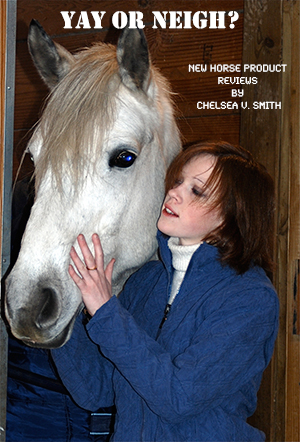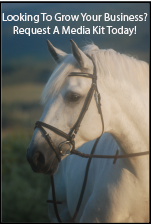Developing Trust ~ Young Riders and Their Horses
By Nikki Alvin-Smith
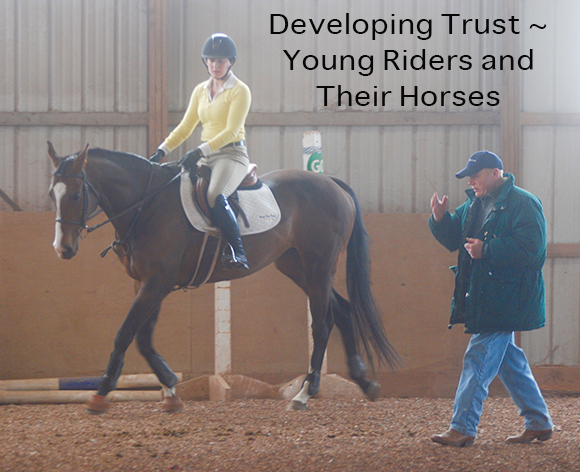
If you’ve ever watched a child interact with an animal you’ll have noticed their innate ability to connect. When you see a child with a pony the partnership is often one that is based more on trust than in the young rider’s ability to control the equine. Almost every horse seems to have a kid mode, and even the hottest of horses can seemingly settle down enough to have a toddler pet them. It really is amazing.
During my experiences as an international dressage clinician it has been my privilege to mentor children of all ages and abilities and to help them work through issues with their riding and develop a deeper trust with their steeds. While working with something as huge as a horse as a little person does require safety education on the ground and in the saddle, the young riders who come in a variety of modes from fearless to intimidated, all seem to progress quickly given the stage is set for their success.
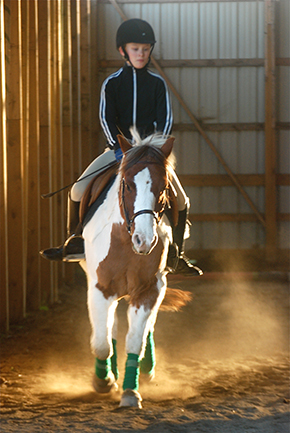 My husband and myself usually work our clinics together, and our duo teaching style can be too much input for the less experienced riders. Personalities of the horse and rider need to be addressed as individuals, and there can be no ‘cookie cutter’ approach to training. Much of the time we’ll just work one on one with the younger riders so as not to risk overwhelming them with instructional input. We have trained high functioning autistic children to young riders who are ready to enter college. There is one golden rule for successfully training a rider of any age, and that is to make sure they have fun. Noone can learn if they are not relaxed, and that goes not just for the rider, but also for the horse. As a clinician you need to have the ability to bring some wit and humor to the event. Remind your students to be happy by providing lots of encouragement, telling them when their equine partner has done well and reward even the tiniest improvement. Leave the drilling and shouting to ‘boot camp’ sergeants!
My husband and myself usually work our clinics together, and our duo teaching style can be too much input for the less experienced riders. Personalities of the horse and rider need to be addressed as individuals, and there can be no ‘cookie cutter’ approach to training. Much of the time we’ll just work one on one with the younger riders so as not to risk overwhelming them with instructional input. We have trained high functioning autistic children to young riders who are ready to enter college. There is one golden rule for successfully training a rider of any age, and that is to make sure they have fun. Noone can learn if they are not relaxed, and that goes not just for the rider, but also for the horse. As a clinician you need to have the ability to bring some wit and humor to the event. Remind your students to be happy by providing lots of encouragement, telling them when their equine partner has done well and reward even the tiniest improvement. Leave the drilling and shouting to ‘boot camp’ sergeants!
Most children do not arrive at our clinics with nervousness in regard to their mounts, but may be intimidated by entering the clinic environment and being watched by an audience of auditors that may include many faces they do not know. As children have no preconceptions of fear around a horse, if their prior education has been well-built, they will already have an intimate connection with their horse and have established some level of trust. As kids spend so much time just hanging out with their horses, playing with them and generally spending lots of positive energy on each other, the foundation for success is already in place.
Adults often bring emotional ‘baggage’ to their riding, which may stem from previous negative riding experiences or just a bad day at home or the office. Focus and mindfulness, living in the moment, is easier for some folks than others. Children generally also have more energy and more physical flexibility than adults that also make the riding easier in some ways. On the other hand they can lack focus, have less coordination and find it harder to understand the clinicians requests. So as the trainer in this equation it is important not to overask, to be able to put the same request in many different ways until it is understood. There is no point in shouting – if the rider didn’t understand it the first time, shouting the same thing louder and repeating the same command will serve no purpose.
Children have less patience than many adults and can become easily frustrated. Changing up the task and not dwelling on past issues is thus an important component of successfully training. And of course we know all the above are just the same when training a horse!
There are differences and similarities when teaching riders of different genders. Confidence is partly genetic, partly conditioned and always fragile, whatever the gender. Sadly there are less boys than girls in the sport of dressage in the U.S.A., and certainly less English riders are male in the USA overall than in Europe as a percentage. Whatever the gender all the same rules for training apply. Our job is to build confidence and trust between the rider and their horse, develop their riding skill set and encourage them to think for themselves in a positive direction.
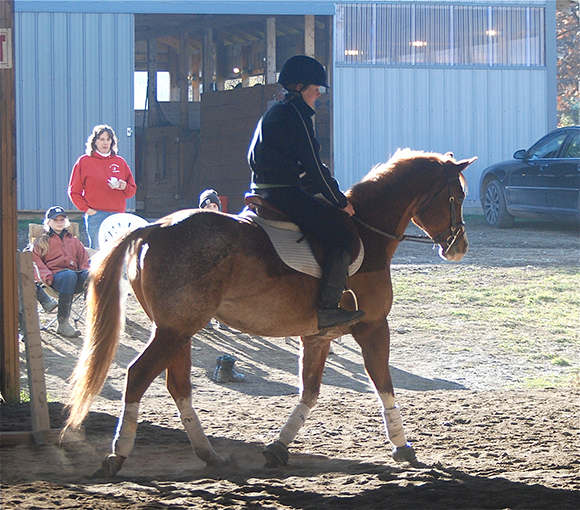
My husband and I have two boys and a girl. One of the lads and the lass are twins. Certainly they received much riding education during their childhood years, and all were given the same opportunities. Just as we notice during our clinic giving, the boys are often more gung-ho and thrill seeking than the girls overall. While our lads just wanted to go fast and jump fences, our daughter was happier being more in control and taking things at a slower pace. That is a huge generalization, but we have also noted during our many clinics that once boys reach puberty their sometimes gawky builds make answering the equestrian demands for poise and balance in the saddle more difficult. As riding is not a sport about strength, whatever gender the rider, everyone has their own physical and mental challenges to face. The key as a clinician is to identify them and work quietly to resolve them.
One of our favorite high-functioning autistic riders literally taught us how she needed to be taught. It was without question the greatest privilege to work with her. The elderly mare she rode in the clinics tolerated all the rider errors, and evidently loved the girl to pieces and their bond was undeniable. The auditor chairs were always full whenever the pair rode, and the bond between my husband Paul and his young protégée was incredible to witness. While she addressed me as, “Paul’s wife,” for many of the early years, this young lady blossomed in front of our eyes to become more confident and coordinated. Her engagement in the lesson was one hundred percent.
All children can benefit from riding and horsemanship training. To engage and care for another living being, to spend time without expectations or judgment with an animal and the learning experience of developing mental focus and physical coordination is so valuable.

